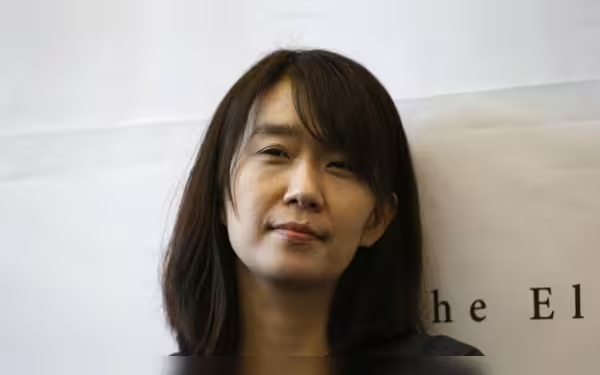Saturday, November 16, 2024 07:30 PM
Han Kang Wins 2024 Nobel Prize in Literature for South Korea
- Han Kang awarded 2024 Nobel Prize in Literature.
- First South Korean to win this prestigious award.
- Her novel 'The Vegetarian' gained international acclaim.
 Image Credits: channelnewsasia
Image Credits: channelnewsasiaHan Kang becomes the first South Korean to win the 2024 Nobel Prize in Literature, recognized for her profound storytelling and exploration of human fragility.
In a remarkable achievement for South Korean literature, author Han Kang has been awarded the prestigious 2024 Nobel Prize in Literature. This accolade recognizes her "intense poetic prose that confronts historical traumas and exposes the fragility of human life," as stated by the Swedish Academy on October 10. The Nobel Prize, which carries a monetary value of 11 million Swedish crowns (approximately US$1.1 million), is one of the highest honors in the literary world.
Han Kang, born in 1970, is the first South Korean to receive this esteemed award. She began her literary journey in 1993 with the publication of poems in the magazine "Literature and Society". Her first collection of short stories, titled "Love of Yeosu", was released in 1995, marking her debut in prose. Coming from a literary family, with her father being a respected novelist, Han Kang has always been surrounded by the world of words.
Her novel "The Vegetarian", which won the Man Booker International Prize in 2016, is often regarded as her major breakthrough in the English-speaking world. The story revolves around Yeong-hye, a woman who, after experiencing disturbing nightmares, decides to stop eating meat, leading her family to worry about her mental health. This novel not only showcases Han's unique storytelling but also highlights her ability to delve into complex themes of societal expectations and personal rebellion.
In addition to her literary accomplishments, two of her works have been adapted into films: "The Vegetarian" in 2009 and "Scars" in 2011, both directed by Lim Woo-seong. Her 2002 novel "Your Cold Hands" further illustrates her fascination with art and the human body, exploring the relationship between the physical form and emotional experiences.
Han Kang is only the second South Korean to win a Nobel Prize, following former president Kim Dae-jung, who received the Peace Prize in 2000. The announcement of her win has sparked discussions among literary enthusiasts, with many speculating on the Academy's choices. Notable authors such as China's Can Xue and Kenya's Ngugi Wa Thiong'o were also in the running, showcasing the competitive nature of this prestigious award.
Mats Malm, the Permanent Secretary of the Swedish Academy, shared insights from a conversation with Han Kang, describing her as having an "ordinary day" after finishing dinner with her son. This personal touch adds a layer of relatability to the celebrated author, reminding us that even those who achieve great heights in literature lead everyday lives.
The Nobel Prize in Literature is often seen as the most accessible of the Nobel awards, drawing both praise and criticism for its selections. Over the years, the Academy has faced scrutiny for overlooking literary giants like Leo Tolstoy and James Joyce, leaving many book lovers puzzled. The award not only elevates authors into the global spotlight but also significantly boosts their book sales, although this surge can be fleeting for those who are not already well-known.
Han Kang's recognition as the 2024 Nobel Prize winner is a significant milestone for South Korean literature and a testament to her innovative storytelling. Her works challenge readers to confront deep-seated societal issues while exploring the delicate balance between life and death. As we celebrate her achievements, it is essential to reflect on the power of literature to inspire change and provoke thought, reminding us of the profound impact that words can have on our understanding of the world.













